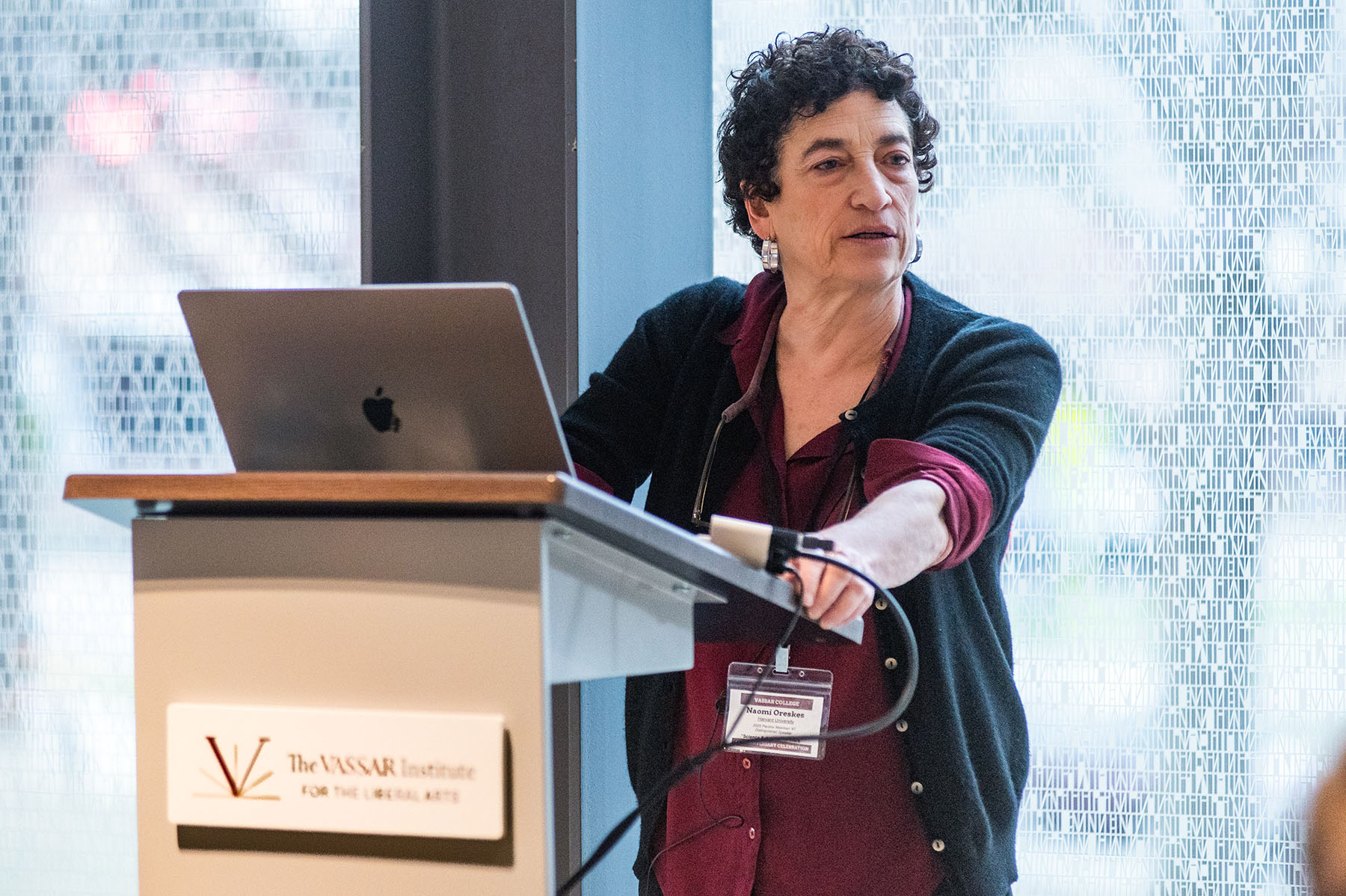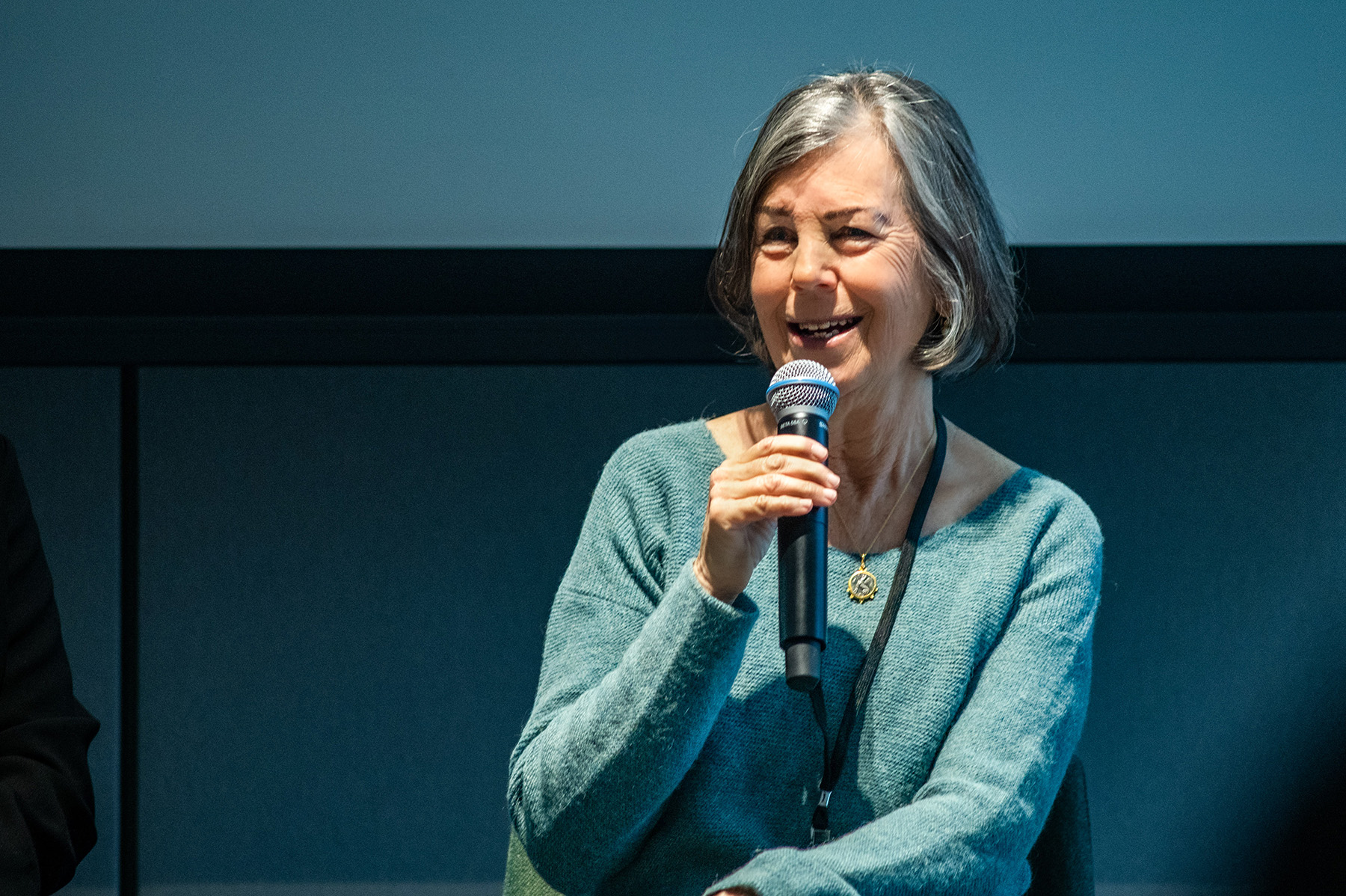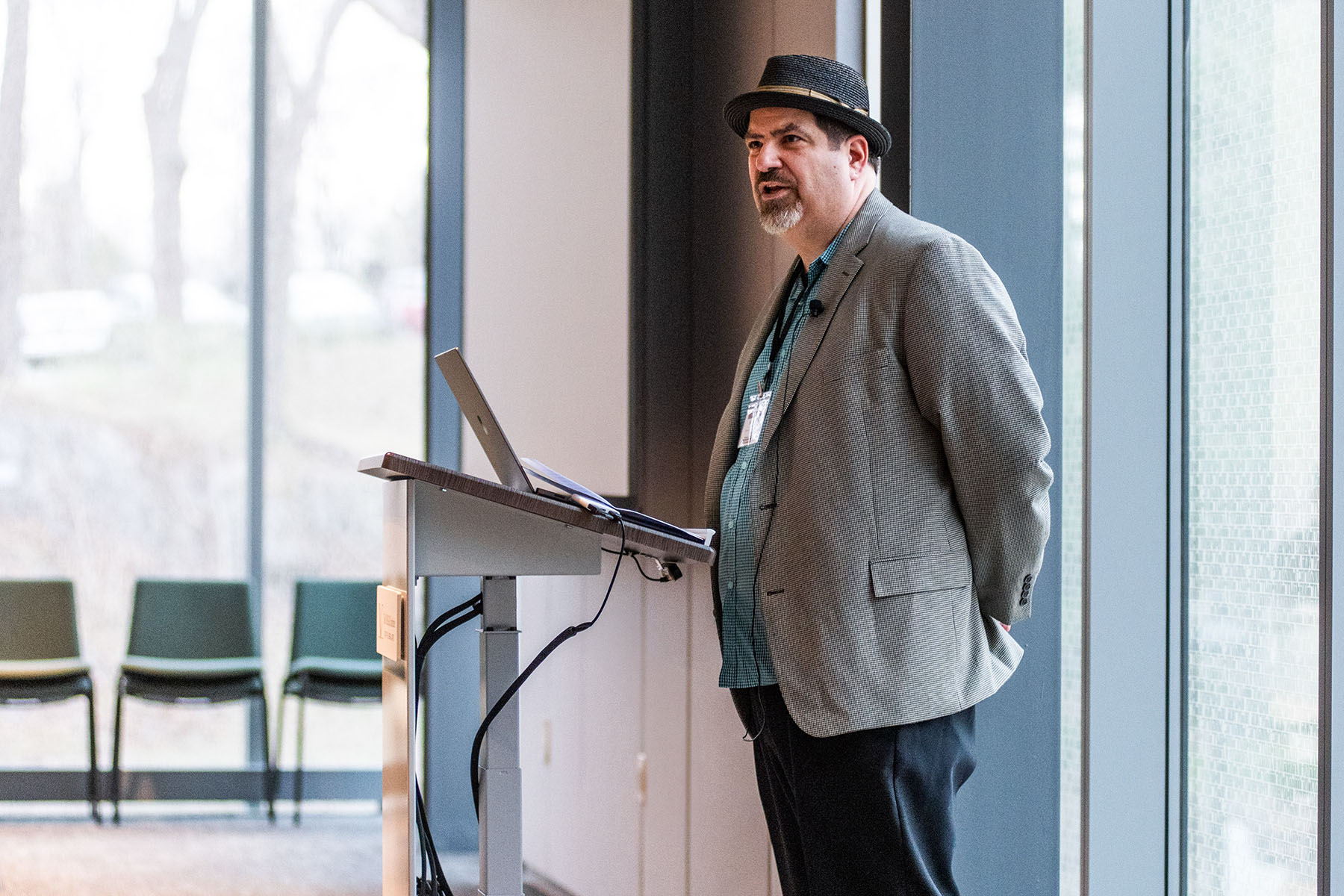Vassar Celebrates 50 Years of Science, Technology, and Society Program with Two-Day Event
Vassar celebrated the 50th anniversary of its Science, Technology and Society Program (STS) with a two-day conference on April 4 and 5, featuring scholars from Vassar, and more than a dozen other institutions, as well as more than 40 alums who had majored in STS, at the Vassar Institute for the Liberal Arts. But José Perillán, Associate Professor of Physics and Astronomy and the current Pauline Newman STS Director, said the program had actually begun in 1971. “It’s really closer to 55 years that the Science, Technology and Human Values program was founded and we saw the first courses and senior theses emerge,” Perillán said.
In his introductory remarks at the start of the conference, he noted that the keynote speaker for the event would be Naomi Oreskes, Henry Charles Lea Professor of History of Science and Affiliated Professor of Earth and Planetary Sciences at Harvard University. Perillán said the genesis of STS could be traced back to a conference hosted decades earlier by then-Vassar student Pauline Newman ’47, who is now a federal judge. “I saw a copy of the program for that event, which was called Science, Philosophy and Society,” he said, “so that was a proto-STS way of thinking in 1947.”

Oreskes’ keynote served as this year’s Pauline Newman Distinguished Lecture, an annual event funded by an endowment created by Judge Newman in 2010. Her talk, titled “From Anti-government to Anti-science and Back Again,” was based primarily on her new book, which analyzes the impact of free-market economics and deregulation from the early days of the 20th century.
“Dr. Oreskes used the material in her book as a jumping off point to reflect on today’s state of the world, the attacks on free speech, and the core principles of higher education,” Perillán said. For many of us, it was a highlight of a day of robust conversations about science and the culture wars, and I am indebted to Judge Newman for her support of the STS Program. So, in a way, we are celebrating nearly 80 years of STS.”
Panel discussions on the opening day of the conference were:
- Politics of Medical and Public Health Controversies,” with remarks by Vassar Assistant Professor of Sociology Catherine Tan, Larry Au of the City College of New York, CUNY, Joanna Kempner of Rutgers University, Andréa Becker of Hunter College, Terrence Keel of UCLA, and Kathleen Sands of the University of Hawaii.
- “Making Scientific Identities and Boundaries,” featuring Perillán and two other Vassar faculty members, Abigail Coplin and Christopher White; as well as Abby Kinchy of Rensselaer Polytechnic Institute, and Chloe Silverman of Drexel University
- “Science & Religion in Culture and the Courts,” featuring Ed Larson and Christina Littlefield of Pepperdine University, Stephen Weldon of the University of Oklahoma, Bill and Susan Trollinger of the University of Dayton, and Glenn Branch of the National Center for Science Education.

The second day of the session featured a panel discussion led by four alums who majored in STS when they were at Vassar. The panelists were: Beth Burnam ’77, a community organizer for a wildfire preparedness organization in Los Angeles; Eleni Macrakis ’14, an affordable housing strategist in Cambridge, MA; Eva Gray ’20, a PhD candidate at the University of Edinburgh, Scotland, and Todd R. Phillips ’80, Executive Vice President of Benchmark Builders, a New York City construction firm.
Perillán, who moderated the discussion, opened the session by noting the diversity of the career paths the four panelists had taken. “It’s easy to see how STS is the quintessential liberal arts major, and these alums are a testament to that,” he said.
Asked to recall a moment in an STS class that had helped prepare her for the future, Burnam described a day when a professor of Philosophy had thrown what appeared to be an orange at her and others in her class. “It turned out to be a hollowed-out skin of the orange that was much lighter than we expected,” she said. “He used the exercise to demonstrate that assumptions we make by appearances are not always accurate.”
Macrakis said that in her final semester at Vassar, she decided to take a course in human rights from Professor of Geography Joseph Nevins. Her participation in the class prompted Nevins to ask her to assist in his research for a book titled A People’s Guide to Greater Boston. Nevins made her a co-author of the book, and the experience led directly to the work she is doing now on affordable housing initiatives in Cambridge. “This experience led me back to STS ways of thinking as I do the work I do now,” she said. “It is a way of making sense of the world through a constellation of topics. It is like looking at black boxes and figuring out how to open them.”
Gray said an STS class she took on gender theory from Chair of Earth Science and Geography Jill Schneiderman had changed the way she looked at the world. “It was the first time I delved into feminist theory, and I learned you can’t study anything without considering gender,” she said. “Once you view something through an STS lens, you can’t ever close it, and that has been useful in my teaching and research at the University of Edinburgh.”
Phillips said his STS experience had enabled him to adapt to his non-linear career path. He said he had aspired to be an architect, “but back then, you had to know how to draw, so I went to law school. After graduation, I became one of the only law school graduates to work installing sheet rock at a construction firm.”
Phillips later started his own firm and later became Vice President at Benchmark Builders. “A lot of the work I do now involves interfacing with all phases of the construction business, and that relates back to my STS training,” he said.
Burnam, who earned an MBA in finance and worked as a financial analyst for many years said that her job, as well as what she called “our most important job, raising our children,” had benefited from her STS training, and her son was an STS major at Vassar. In her current job as a community organizer for fire safety, Burnam said she often draws on her STS training for one of her principal tasks—helping homeowners adapt to rapidly changing situations. “Re-envisioning the future and adapting—that’s STS,” she said.

As the two-day event concluded, Perillán said it had been even more successful than he had envisioned. “It started as a plan to simply celebrate the 50th anniversary of STS, but it evolved into bringing scholars and alums together to engage in scholarly dialogue, and that went really well,” he said. “So it has been both a celebration and a time of intellectual engagement, and the connections that were made here will foster collaborations in the future. To do something like this takes a total team effort, and would not have been possible without my conference co-chair, Chris White (Professor and Chair of Religion), and our amazing administrative team.”
He said he planned to write a history of the STS program, a project that was started by one of the pioneers of the STS program, James Challey, Senior Lecturer Emeritus in Physics and STS.
Challey said he had enjoyed watching the program grow and flourish over the past five decades. “Seeing our former students launch successful career paths is what teachers dream about,” he said. “It’s clear that multidisciplinary and interdisciplinary teaching has become a major part of learning at the College. Programs such as Urban Studies, Environmental Studies, and Media Studies all grew out of STS. It’s been fun to see it all happen.”